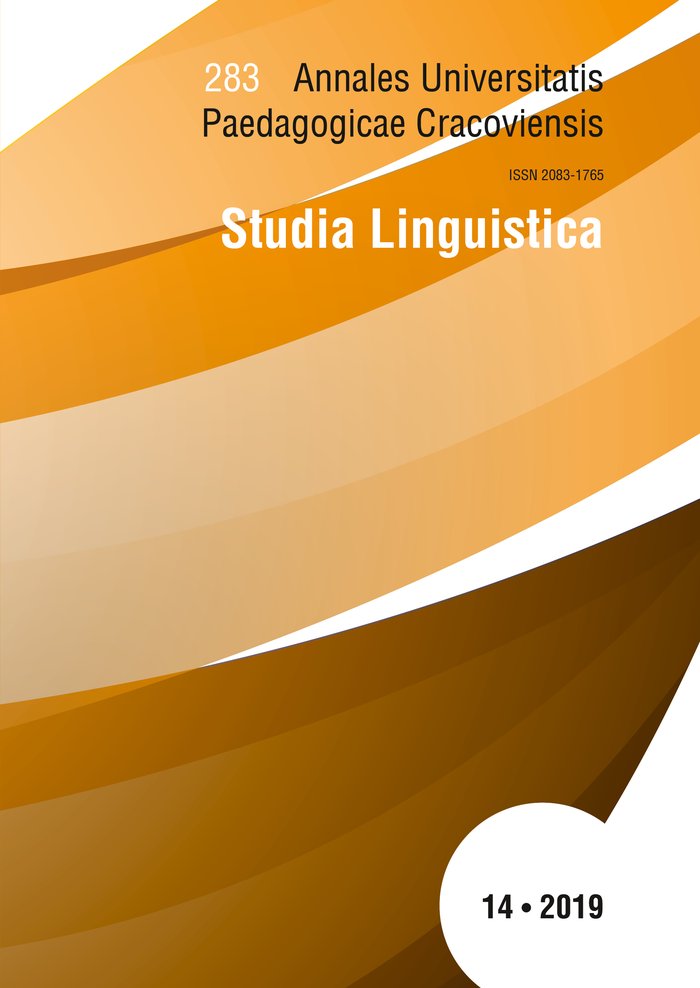Pięćdziesiąt lat minęło. O polskim dopełniaczu liczby pojedynczej raz jeszcze.
Main Article Content
Abstrakt
1968 saw the publication of Józefa Kobylińska’s monograph entitled Rozwój form dopełniacza liczby pojedynczej rzeczowników rodzaju męskiego w języku polskim [The development of the forms of the genitive singular of masculine nouns in the Polish language]. Whoever intends to write about the Polish masculine genitive singular cannot neglect this publication, especially so because the selection of the endings -a and -u still poses a problem for modern Poles. The author of the article intends to supplement the fragments of the monograph which refer to the sources of the vacillations in the selection of endings. She puts forward a thesis that the source of the ending -u in the genitive was not only the 2nd declension but also the forms of the dative of the 1st declension. The author continues to ask, why the ending -a was preserved by animate nouns. It turns out that among all the functions of the genitive (genetivus qualitatis, genetivus partitivus, genetivus absolutus) Saxon genitive was the prevailing one; a noun in the genitive indicated the possessor, and the latter was a person, less frequently an animal. Possessive form expressed by the dative (cf. Bogu rodzica) was not pure, it frequently connoted an existential function.
Downloads
Article Details
Autor, zgłaszając tekst do redakcji czasopisma „Annales Universitatis Paedagogicae Cracoviensis. Studia Linguistica”, zaświadcza, iż jest on rezultatem wyłącznie jego własnej twórczości, że treść artykułu nie była dotychczas publikowana oraz że utwór nie narusza w żadnym stopniu praw autorskich ani praw pokrewnych innych osób, jak również innych praw osób trzecich, a także, że niczyje prawa do utworu (lub jego jakiejkolwiek części) nie zostały pominięte. Po podpisaniu umowy prawa majątkowe do opublikowanych materiałów zostają przeniesione na Wydawnictwo Naukowe Uniwersytetu Komisji Edukacji Narodowej w Krakowie.
Rocznik „Annales Universitatis Paedagogicae Cracoviensis. Studia Linguistica” to czasopismo o otwartym dostępie, a cała jego zawartość jest udostępniana bezpłatnie dla użytkowników i instytucji na zasadach licencji Creative Commons CC-BY-NC-ND 4.0 (uznanie autorstwa, użycie niekomercyjne, bez utworów zależnych). Na podstawie tej licencji autorzy zgadzają się, że ich prace mogą być zgodnie z prawem ponownie wykorzystywane do jakichkolwiek celów, za wyjątkiem celów komercyjnych, bez konieczności uzyskania uprzedniej zgody ze strony autora lub wydawcy. Każdy może prace te czytać, pobierać, kopiować, drukować, rozpowszechniać oraz przetwarzać, pod warunkiem poprawnego oznaczenia autorstwa oraz oryginalnego miejsca publikacji. Publikowanych tekstów nie można wykorzystywać do tworzenia utworów zależnych (np. do tłumaczenia ich i publikowania w innym języku bez zgody wydawcy). Jest to zgodne z definicją otwartego dostępu BOAI (Budapest Open Access Initiative) „Studia Linguistica”nie pobiera opłat za składanie artykułów ani ich przetwarzanie.
Autor, przesyłając artykuł do redakcji „Studia Linguistica”, bezwględnie zgadza się z poniższymi punktami:
-
Oświadczam, że jestem Autorem lub Współautorem nadesłanego tekstu. Przesłany tekst nie był nigdzie publikowany, jest całkowicie oryginalny i nie narusza w żadnym stopniu praw autorskich ani praw pokrewnych innych osób, jak również innych praw osób trzecich, a także, że niczyje prawa do utworu nie zostały pominięte.
-
Oświadczam, że nadesłany tekst nie został złożony do recenzji lub/i publikacji w innym czasopiśmie.
-
Przyjmuję do wiadomości, że Autor ponosi pełną odpowiedzialność za każdy przypadek plagiatu, niezależnie od tego, czy został on wykryty podczas procesu recenzji, czy po publikacji w „Studia Linguistica”.
-
Oświadczam, że ponoszę pełną odpowiedzialność finansową i prawną za wszelkie roszczenia związane z utworem.
-
Potwierdzam uznanie wszystkich źródeł danych wykorzystanych i cytowanych w badaniach.
-
Potwierdzam, że artykuł został wykonany z należytą starannością zgodnie ze standardami edytorskimi „Studia Linguistica”.
Bibliografia
Berstein S., 1985, Zarys gramatyki porównawczej języków słowiańskich. Alternacje. Tematy imienne, tłum. J. Wawrzyńczyk, Warszawa (tytuł oryginału: Oчерк сравнительной грамматики славянских языков, 1961).
Google Scholar
Brodowska (Honowska) M., 1955, Historyczne procesy przekształceń polskiego celownika w formy przyimkowe, „Studia z Filologii Polskiej i Słowiańskiej” I, s. 9−57.
Google Scholar
Gawęda E., 1981, Tendencje normatywne w zakresie wariantywnych form gen. sg. masc. rzeczowników, „Studia Polonistyczne”, t. IX, s. 159−170.
Google Scholar
Kempf Z., 1978, Próba teorii przypadków, cz. I, Opole.
Google Scholar
Klemensiewicz Z. i in., 1966, Zapomniane konstrukcje składni staropolskiej, Wrocław.
Google Scholar
Klemensiewicz Z. i in., 1971, Zapomniane konstrukcje składni średniopolskiej. Wybór przykładów, Wrocław.
Google Scholar
Kleszczowa K., 1996, Staropolskie pogranicza fleksji i derywacji, [w:] Studia historyczno językowe 2, red. M. Kucała, Kraków, s. 23–30.
Google Scholar
Kobylińska J., 1968, Rozwój form dopełniacza liczby pojedynczej rzeczowników rodzaju męskiego w języku polskim, Wrocław–Warszawa–Kraków.
Google Scholar
Kuryłowicz J., 1987, Słowiański genetivus po negacji, [w:] Studia językoznawcze. Wybór prac opublikowanych w języku polskim, Warszawa, s. 462−465.
Google Scholar
Łuczyński E., 1973, Zagadnienie repartycji końcówek dopełniacza liczby pojedynczej rzeczowników rodzaju męskiego we współczesnym języku polskim, „Prace Językoznawcze” nr 2, s. 73−90.
Google Scholar
Mańczak W., 1953, O repartycji końcówek dopełniacza -a : -u, „Język Polski” XXXIII, s. 111−127.
Google Scholar
Olma M., 2002, Dopełniacz liczby pojedynczej rzeczowników męskich w XVI- i XVII-wiecznych tekstach małopolskiej literatury plebejskiej, „Annales Academiae Paedagogicae Cracoviensis 6. Studia Linguistica” I, s. 259–288.
Google Scholar
Pisarkowa K., 1974, Posesywność jako przykład problemu gramatycznego, „Biuletyn Polskiego Towarzystwa Językoznawczego” XXXII, s. 3−17.
Google Scholar
Pisarkowa K., 1984, Historia składni języka polskiego, Wrocław.
Google Scholar
